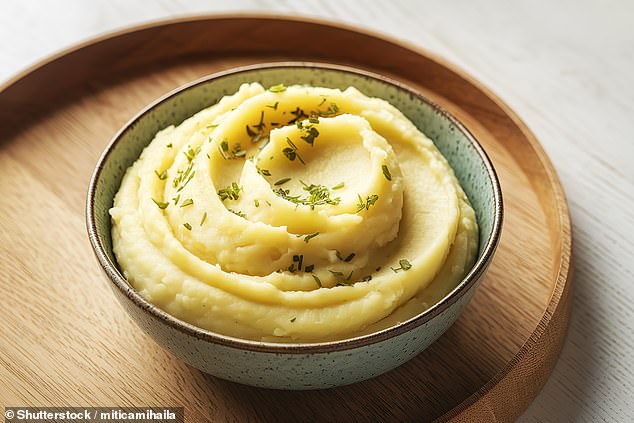It’s an age old question: why is mashed potato always so much better when the experts make it?
And while many agree the answer is lashings of salt and butter, some chefs insist there is far more to the art of a velvety mash.
Inspired by a popular Reddit thread calling on professionals to reveal their secrets, chefs have now spilled their once gate-kept methods – and the gadgets they swear by for an indulgent, creamy result.
‘I’m still figuring out how to cook, but one thing that always confuses me is mashed potatoes at restaurants,’ the post began.
‘They’re so creamy, smooth and buttery without tasting too heavy. I don’t know what they’re doing differently, but mine never turn out like that… it still feels like something’s missing.
‘Just wondering what makes restaurant mashed potatoes hit different?’
A fine dining chef who claimed to have worked under Michelin star chefs for many years immediately jumped in to share the method he’s been using for years.
‘[We use] either a tamis with a plastic bench scraper or a China cap with a ladle used to push it through,’ he said.

It’s an age old question: why is mashed potato always so much better when the experts make it?
!['[We use] either a tamis (pictured) with a plastic bench scraper or a China cap with a ladle used to push it through,' one chef said](https://i.dailymail.co.uk/1s/2025/07/21/03/100479635-14923919-_We_use_either_a_tamis_pictured_with_a_plastic_bench_scraper_or_-m-6_1753063327821.jpg)
‘[We use] either a tamis (pictured) with a plastic bench scraper or a China cap with a ladle used to push it through,’ one chef said
A tamis – pronounced ‘tammy’ – is a drum-shaped sieve with fine mesh attached. A China cap is a cone-shaped strainer with perforated metal on the inside.
‘When we’d make Pomme Puree [velvety mash] we would do about 16 cups of peeled Yukon gold potatoes soaked (in water to prevent oxidisation) and cut up to an even size,’ the chef continued.
‘Bring them to boil in a pot with just enough salted (and I mean pretty flavorful) water to cover the surface. Less water = better texture mash.
‘Once it was boiling I’d reduce it to a simmer until a cake tester came out clean but not where the potatoes got over cooked/mealy. You don’t want that either.’
The chef then advises immediately draining the water, ‘tamising or ricing’ the potatoes into a large bowl and adding simmered heavy cream to the desired texture. Follow that with about 500g of cubed-up good quality cold butter.
‘The cold butter helps mount and emulsify the potatoes so that they have an incredibly smooth texture,’ he said.
‘After emulsification we’d sometimes add some garlic thyme brown butter we’d prepped earlier and quickly stir it in so it would stay emulsified. Salt and season to taste.
‘Most places I’ve worked have done this or similar.’

‘Once it was boiling I’d reduce it to a simmer until a cake tester came out clean but not where the potatoes got over cooked/mealy. You don’t want that either,’ he said
Hundreds agreed with this chef’s approach, while others weighed in with their own tips – mostly involving excessive amounts of butter and cream.
‘So much butter and cream. Way more than you would imagine. Like some of the fancier and more luxurious places are doing their mashed potatoes 50 per cent butter by weight,’ one confessed.
‘I’m a chef. It’s what everyone else said. A s**tload of butter, salt, white pepper and cream. Like an amount you’ve never considered because most normal people can’t comprehend it,’ another agreed.
‘So much more butter. Like a comical amount,’ one more admitted.
Others offered a little more substance with specific tips they’ve always sworn by.
‘Bake the potatoes in the oven in their skin, scoop out flesh, put through potato ricer, add hot milk flavored with bay leaf, add lots of butter and salt,’ one chef said.
‘Another tip to level up your mash is to steep garlic and herbs in the cream, then strain them out before you add it. It’s awesome,’ another suggested.
‘Use a potato ricer, better butter and higher fat dairy. Make sure you’re using the right potato. Mix them to amalgamate and no more. Don’t overwork them, they’ll get pasty. Rest them, they’re often made towards start of shift and reheated as needed… and I don’t know why sitting for an hour-plus helps, but it makes a difference,’ one more concluded.

The chef said he’d always use peeled Yukon gold potatoes soaked (in water to prevent oxidisation) and cut up to an even size









